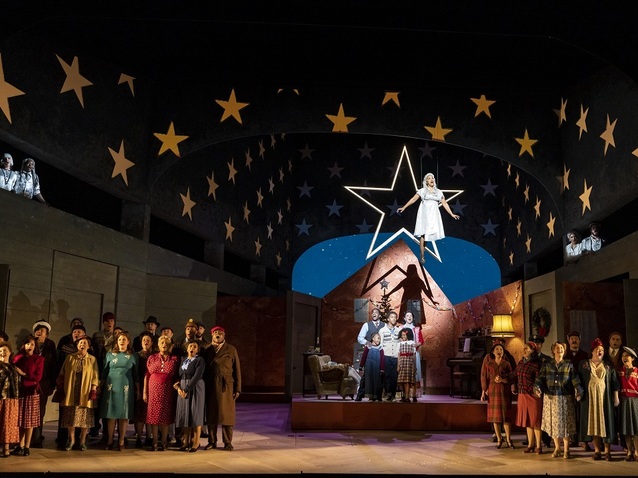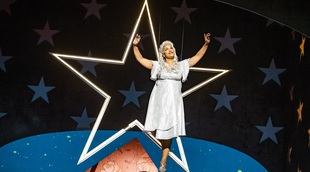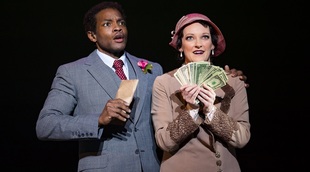 © Lloyd Winters
© Lloyd Winters
Frank Capra’s It’s a Wonderful Life of 1946, itself based on Philip Van Doren Stern’s short story The Greatest Gift (self-published in 1943), is one of the all time classic Christmas films. It sees George Bailey, played by James Stewart, grow up in the first half of the twentieth century in an American town named Bedford Falls. George has ambitions to go to college and see the world, but at every point in his life he is held back by circumstances and a sense of duty. When his father dies, George decides to stay in the town to run the family business, Bailey Brothers Building and Loan, while his younger brother Harry goes to college. When Harry sees action in the Second World War as a navy fighter pilot, and returns a hero for preventing an attack that saved many lives, George is forced to stay at home because an incident as a child when he saved Harry from drowning left him deaf in one ear. Above all, George feels compelled to give people a fair deal so that they can live in decent houses. In this way, he is the only person to hold out against the mean Henry F. Potter who practically runs the town, and who wants to sink Bailey Brothers Building and Loan because its far more ethical lending practices are digging into his profits.
When the Wall Street Crash in 1929 leads to a run on the bank, George and his new wife Mary manage to keep the Building and Loan open by using the money with which they were about to go on honeymoon. When, however, on Christmas Eve 1945, George’s Uncle Billy absent-mindedly loses eight thousand dollars, which could prompt criminal charges, George becomes bitter that everything in his life has turned out so badly. After letting rip at his family, he stands over a bridge contemplating suicide when Clarence Odbody, a guardian angel second class who has not yet earned his wings, appears in order to rescue him. When George says it would have been better if he had never been born, Clarence decides to show him exactly what the world would be like if that were the case. Taking him on a tour of Bedford Falls, which feels so familiar and yet so different, George sees a town where everyone lives in poverty and depravity because it is entirely run by Potter. He also discovers Harry’s grave because George was not there to rescue him as a child, meaning that all of the lives Harry saved during the War were lost as well. Realising all he has achieved, George embraces life once more, as the many people he has helped over the years rally around to replace the missing money, and Clarence, with his mission to save George accomplished, earns his wings.
Composer Jake Heggie and librettist Gene Scheer’s operatic adaptation of the story first appeared at the Houston Grand Opera in 2016, and now English National Opera brings a new production by Aletta Collins, with set designer Giles Cadle, to the London Coliseum for what certainly feels like a Christmas treat. In some ways, the story of the film is followed quite closely, but the departures there are feel quite significant. There are a few minor changes, such as George’s saving of the local pharmacist from an impending disaster being omitted, because operas are better suited to dealing with fewer plot points than films. The most obvious difference, however, lies in the character of Clarence who here becomes Clara and is played by Danielle de Niese. While in the film this guardian angel is introduced at the start, but then not seen while both he and the audience are shown George’s life up until the present, here Clara is on stage the whole time observing what happens to him.
Clara even discovers she can halt the action by removing her hat, making for some entertaining moments as the stops and starts to the characters’ singing are written into the score, and they freeze in a variety of awkward poses. De Niese, with her radiant soprano, is outstanding in the role as she constantly reacts to what unfolds, and reveals immense sympathy for George as things do not pan out for him as he had planned. Particularly skilful are her expressions when Harry announces he is married as she mixes joy for him with sorrow as it means he will not be returning to take over the Building and Loan so that George can go to college. It is also an excellent touch to introduce four guardian angels first class, played by Idunnu Münch, Keri Fuge, Zwakele Tshabalala and Ossian Huskinson. By already having their wings, they reveal what Clara aspires to, and they help to frame the story while also contributing some beautiful harmony singing.
There are a few weaker moments that often derive from difficulties in transferring certain film scenes to stage, such as the episode at George’s graduation dance. His rival for Mary’s affections, Sam Wainwright (Chris Dunckley), opens up the floor where George and Mary are dancing to reveal the swimming pool beneath with the aim of humiliating them, but when they do fall in they steal the show and half the party follows them in jumping in. In the absence of any water here, it is difficult for those unfamiliar with the film to grasp exactly what is going on, and impossible to feel for the scene in the same way. Similarly, George’s constant desire to travel and see the Parthenon and Colosseum, while important to emphasise, is repeated so many times in the libretto that it just becomes monotonous.
Nevertheless, the opera does largely manage to capture the magic of the film. It begins with Clara swinging among the stars, and as she falls to earth graphics really make it seem as if we are being whisked through the cosmos. When the snow falls it could not feel more evocative, and the tender scene in which George and Mary get together, which here closes Act I and includes the famous line about wanting to ‘lasso the moon’, seems guaranteed to send tingles down the spine. As well as being imbued with emotion and charm, the score has its fun elements as the fictional Mekee-Mekee dance with its ‘twist, shuffle, hop’ is incorporated into it, acting in part as a substitute for the song ‘Buffalo gals, won't you come out tonight?’ that is sung in the film.
Nicole Paiement conducts superbly while the cast is notably strong. As George, Frederick Ballentine may not quite capture James Stewart’s levels of bitterness and anger, but, with his splendid tenor, presents a highly convincing portrayal of the dutiful and constantly ‘jinxed’ George. Jennifer France provides a similarly persuasive depiction of the loyal, but far from subservient, Mary as it is her idea to keep the Building and Loan open by surrendering her and George’s honeymoon money. Michael Mayes is tremendous as the villain of the piece Potter, as he ensures his seemingly upstanding presence only thinly veils his cruel and selfish nature, while there is excellent support from, among others, Ronald Samm as Uncle Billy, Donovan Singletary as Harry and Gweneth Ann Rand as George’s mother.
The scene in which George is actually shown what the world would be like if he had never been born is arguably more interesting than it is strictly successful. The music stops for it, which ties in with the idea of him not existing, but all of his meetings with figures such as his mother, who do not know him now, are rendered (through dialogue) in the abstract rather than on familiar streets. In fact, traffic lights descend that turn green when we see the alternative reality play out before us, and red whenever George describes the scenario where he is present but which no longer exists. All of these decisions lead to the scene feeling quite short and relatively insignificant for what is ultimately the backbone to the story’s thesis. It is still a fairly brief segment in the film, where it also takes quite a while to reach, but it feels as if the opera takes to further extremes what the movie had already stretched to the maximum. In addition, the depraved Pottersville (what Bedford Falls has become without George) with, for example, its burlesque entertainments would seem ripe for rendering effectively on a stage.
Nevertheless, the opera is still packed with emotional moments, and as we watch George and Clara on the bridge as he utters the immortal line ‘I wish I’d never been born’, and consider how his guardian angel might save him from here, it is enough to bring a tear to the eye. English National Opera is standing at the very heart of bringing Christmas cheer to London, and that is how it should be.
By Sam Smith
It’s a Wonderful Life | 25 November – 10 December 2022 | London Coliseum
the 29 of November, 2022 | Print


Comments